Iraq airport expansion continues to reshape the country’s aviation sector, with three major airports set to open in 2025. The Ministry of Transport confirmed plans to launch Mosul, Karbala, and Nasiriyah international airports as part of a broader strategy to modernize Iraq’s air travel network.
Maitham Al-Safi, the Ministry’s spokesperson, stated that these airport projects support Iraq’s civil aviation development. He emphasized that strategic programs focus on infrastructure, connectivity, and international partnerships. Iraq airport expansion plays a vital role in these national plans.
Mosul International Airport is now fully ready for commercial operations. Following a successful trial in early June, the airport is open to licensed airlines. Once destroyed during the ISIS conflict, Mosul Airport now ranks as Iraq’s third most important airport, after Baghdad and Basra.
Meanwhile, Karbala International Airport is over 75% complete. Its design reflects the Islamic and cultural heritage of Karbala province. A French firm handled the design, while a British company manages construction. The airport will serve three million passengers yearly in the first phase, then scale up to 20 million through later stages.
Karbala Airport is strategically positioned between Najaf and Karbala, around 32 kilometers southeast of Karbala. Its location is expected to serve both religious pilgrims and general travelers. This facility strengthens Iraq airport expansion goals and supports domestic and international mobility.
Nasiriyah International Airport will also be operational by the end of 2025. A Chinese company, CSCEC, is developing the project. This airport marks another important step in the government’s efforts to improve regional air infrastructure. Iraq airport expansion through projects like Nasiriyah aims to increase travel efficiency and regional development.
These upcoming airports, along with existing ones, will create a broad civil aviation network. This network will directly contribute to Iraq’s Development Road initiative by improving transportation links across the country. The plan also seeks to boost trade, tourism, and investment.
In addition, the Ministry of Transport has partnered with the International Finance Corporation. Together, they are working on strategic airport development and renovation plans. Iraq airport expansion remains a central theme in these collaborations, reflecting the country’s vision for modern, sustainable air travel.


